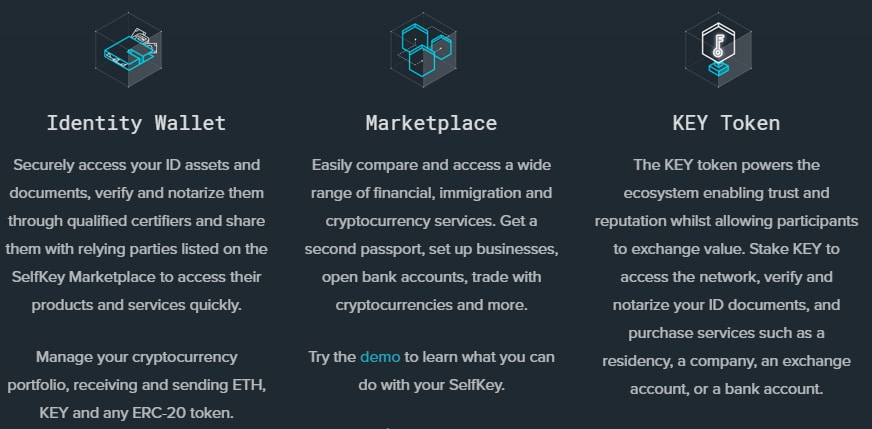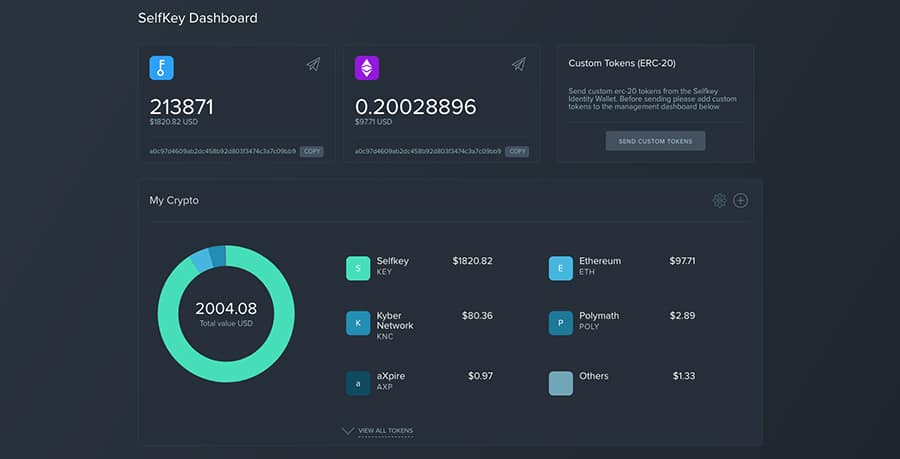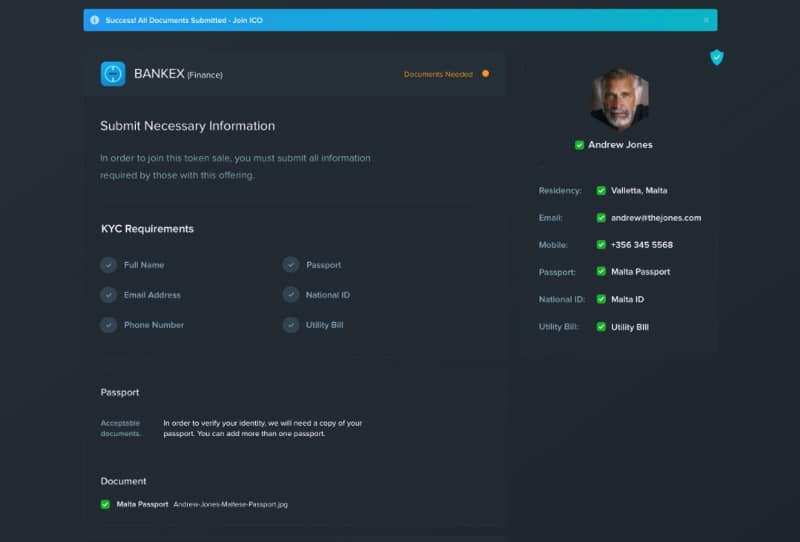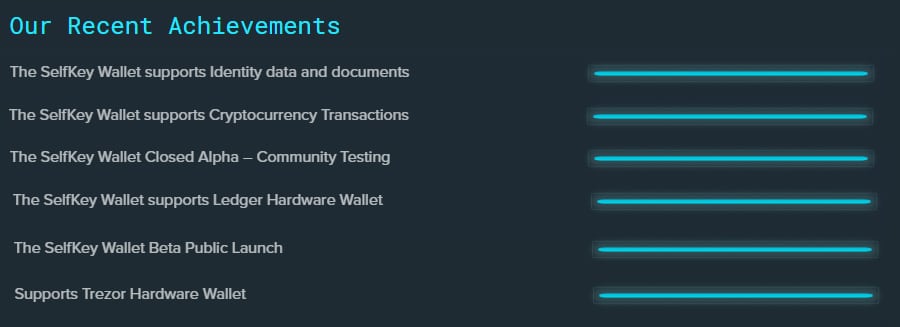When it comes to blockchain identity management, one project that has garnered quite a bit of interest is that of SelfKey.
SelfKey is trying to create an ecosystem where users can retain full ownership of their digital identity without the risk of theft in centralized databases. This technology will also allow exchanges and ICOs to fully verify traders and contributors to the project.
However, can SelfKey stand out from the competition?
In this review of SelfKey we will give you everything that you need to know about the project. We will dig into the underlying technology as well as the team background and experience. We will also analyse the KEY token use cases and price potential
What is SelfKey?
SelfKey is working to created a Self-Sovereign Identification System (SSID) that is blockchain based and decentralized, with all identity information remaining fully in control of the individual to whom it belongs.
 SelfKey Overview
SelfKey OverviewThe SelfKey technology will enable people to store all their identification information and documents on their own device, which means information only needs to be input once and it becomes indelible on the blockchain. This becomes increasingly valuable when you see the marketplace that SelfKey is implemented, which will give users access to a wide range of services and products using their universal digital ID.
SelfKey was created by KYC Chain, a Hong Kong solutions provider in the Know-Your-Customer space that’s been doing business since 2013. The customer base of KYC Chain includes global banks, immigration and law firms.
The KYC Dilemma
The team at KYC Chain developed SelfKey to address the limitations in current identity systems, which include:
- Inefficient KYC Processes: Even though KYC has become a mandatory requirement for many industry segments, the process remains time-consuming and expensive. Physical documents need to be repeatedly uploaded, processed and stored, creating inefficiencies in the KYC process. There are also security risks associated with sending identity documents to satisfy KYC requirements.
- Security Risk: The centralized databases used for identity systems currently are a single point of failure, making them more vulnerable to large scale data breaches. Just think of the data breaches seen recently at Equifax and Facebook. Centralized identity systems are a liability and a cause of many identity thefts.
- Data Protection Regulations: Of course regulations have been developed to protect data from the above security risks, but those regulations differ from one jurisdiction to another. This has created inefficiencies and higher costs, especially for smaller businesses. It also prevents users from having complete control over their own identity data.
- Restricted Access: The centralized data storage operators have in many cases restricted access to identity data to avoid identity theft and data breaches. This has created a problem for the identity owners who are finding extreme limitations in being able to access their own identity data due to access restrictions put in place by data collectors.
The SelfKey Ecosystem
SelfKey will be made-up of two distinct components in addition to the native token that will facilitate actions within that ecosystem. Those two components are the SelfKey wallet and the SelfKey Marketplace.
The SelfKey Wallet
The SelfKey wallet, which is in beta since June 2018, is where users will be able to securely store and manage their identity documents and attributes. Additionally it will allow users to manage their cryptocurrency portfolios (currently supports ERC-20 tokens).
The wallet is currently available for Windows and OSX. It will store all user identity documents and information securely on the users own device, ensuring privacy and total control over their own information. The wallet also offers notarization or simple verification of documents through qualified certifiers.
 The SelfKey Wallet interface
The SelfKey Wallet interfaceThe SelfKey wallet will act as a universal ID, giving users a seamless way to access a variety of services and products through the SelfKey marketplace. Data remains secure however as any data stored on the users device is not tied to the SelfKey ID in any way.
The Dashboard is clean and simple, giving users easy access to both their ID data and cryptocurrency holdings.
The SelfKey Marketplace
The SelfKey marketplace is already in its alpha testing stage. It will allow Safekey users easy access to services and goods, and since ID information is already securely stored it will greatly reduce paperwork and delays inherent in the current KYC/AML processing. SelfKey has identified 22 categories of service to offer in its marketplace and half of those already have established partners.
SelfKey ID
The ID portal within the SelfKey wallet is quite user-friendly and easy to navigate. It also allows for quick and easy edits to ID attributes when necessary. Most users will be able to complete all fields and attach all necessary documents in under 5 minutes.
And once the SelfKey ID is complete it can be used across the entire range of goods and services available in the SelfKey marketplace. This will be a huge time and money saving feature. Of course this depends on Safekey being able to forge partnerships and attract providers to their marketplace.
 The SelfKey ID
The SelfKey IDBecause the SelfKey ID remains in beta it isn’t possible yet to see the complete range of products and services that will eventually be available, but the SelfKey team has broad aspirations. In theory any business that needs to utilize KYC or any type of identity verification would be a good fit for SelfKey, which includes banking, financial services, legal services, immigration services, insurance and even healthcare.
Selfkey has made its source code and API open source, which could increase adoption since any company will be able to build on the SelfKey application layer to include new services.
SelfKey Team
SelfKey has a large team that consists of over 80 employees in the areas of Development, Growth, Legal and Advising. Roughly one-third of the team is comprised of developers and engineers, which has helped the project move forward rapidly. Although the team is based in Hong Kong, the SelfKey foundation is a entity that is registered in Mauritius.
 Founder of SelfKey, Edmund Lowell gives a Talk in Malta. Source: Twitter
Founder of SelfKey, Edmund Lowell gives a Talk in Malta. Source: TwitterThe head of the SelfKey team is the CEO of KYC Chain, Edmund Lowell. He is a serial entrepreneur who has founded a number of companies within the identity space.
SelfKey also has a large and diverse group of advisors helping to guide the project. These advisers are spread across industry groups and geographies which could help not only in driving the technology forward but also in engaging with the required regulatory bodies.
Selfkey Roadmap
SelfKey has recently completed their integration with the Ledger and Trezor hardware wallets. Through the end of 2018 the team is working on the following goals:
- Cryptocurrency Exchanges Marketplace
- Staking Functionality of KEY Token
- Launch of “Login with SelfKey” Button & Browser Extension
- Incorporations Marketplace
Because each marketplace requires its own intensive development, and since there are 22 different marketplace categories, it could take some time to complete full access to all of the marketplace categories.
 Some recent achievements of the SelfKey Team
Some recent achievements of the SelfKey TeamHeading into 2019 the team expects to focus on the following goals:
- Bank Accounts Marketplace
- Trusts & Foundations Marketplace
- Residency & Passports Marketplace
- Dedicated Functionality for Claims Issuers
- Launch of DID/DIF Identity Architecture
- SelfKey Mobile Wallet Alpha (Android & iOS)
- Corporate Identity Wallet Launch
- Multi-Signature Function for Corporate Identity Wallet
- Login with SelfKey integrated with 10+ websites
The KEY Token
The native SelfKey token goes by the ticker symbol KEY and it is an ERC-20 token that was built on the Ethereum blockchain. KEY is a utility token which serves to provide value on the SelfKey network.
At this time it is expected that KEY tokens will be used to access the goods and services in the SelfKey marketplace. They will also be used to pay for notarization, verification and certification services, as well as any fees such as for opening a bank account or beginning an insurance policy.
Companies offering their services in the SelfKey marketplace will be expected to lock a certain amount of KEY tokens in a smart contract. Users and certifiers will also be expected to stake KEY tokens for various purposes, and this is expected to cause the value of KEY to rise in direct relation to network usage. The token supply is fixed at 6 billion, so increased demand from the network should increase the price of the KEY token.
 Register at Binance and Buy KEY Tokens
Register at Binance and Buy KEY TokensSelfKey held an ICO in January 2018, raising $21.8 million and selling 2 billion KEY tokens at $0.015 each. The token reached an all-time high of $0.07 soon after on January 15, but then declined to below $0.006 by June 2018. It popped higher when the SelfKey wallet was released, reaching above $0.03 in early July 2018, but has once again declined and as of November 2018 it is trading at just $0.005 or roughly 65% below its ICO price.
Almost all of the trading volume in KEY is on Binance, where you can purchase it using BTC or ETH. There is very small volume trading happening at KuCoin and OKEx.
Since KEY is an ERC-20 token it can be stored in any ERC-20 compatible wallet, but since the SelfKey wallet is also used for your identity data storage it’s presumed you will store it there. The SelfKey wallet also has integration with the Trezor and Ledger hardware wallets for those looking for added security.
SelfKey Strengths
The most prominent strength for SelfKey is that its universal digital ID solution allows users to efficiently and seamlessly complete KYC requirements across a number of service providers. More critically, the user maintains complete control over their own data at all times.
SelfKey was not begun by a small group of developers, but was the brainchild of an already functioning company. With KYC Chain backing the SelfKey development process it has access to experience, expertise and infrastructure in the KYC industry.
 Extensive Team working on SelfKey. Source: SelfKey blog
Extensive Team working on SelfKey. Source: SelfKey blogSelfKey has already created an extensive list of partners who will be involved in the SelfKey ecosystem and marketplace. This shows that the project has been gaining traction, and will have a strong launch when its beta testing period concludes.
Finally, with 22 market categories already identified, and half of those in development users can expect to have access to a wide array of services and goods utilizing their universal digital ID.
SelfKey Weaknesses
On the downside, SelfKey is in an extremely competitive niche. They are far from the only project trying to solve the digital ID problem. For example, Civic (CVC) has been around much longer than SelfKey, and is further along in product development. That said, the rate of development at SelfKey has been such that they will soon overtake and surpass Civic and other competitors.
Another downside is the lengthy development process. A completed product likely won’t launch until 2020, but this is true for many blockchain based products.
Conclusion
SelfKey is working to solve a global problem of tedious and expensive KYC processing. Their solution of a universal ID is expected to give users seamless access to a wide range of services and goods that require ID documents. Given that KYC requirements are only increasing the SelfKey solution should become increasingly useful.
SelfKey is backed by an established business and experienced team, and has already formed several strong partnerships. The development team has been bringing the product to market faster than competitors, which could put SelfKey at the front of its industry in the coming year.



